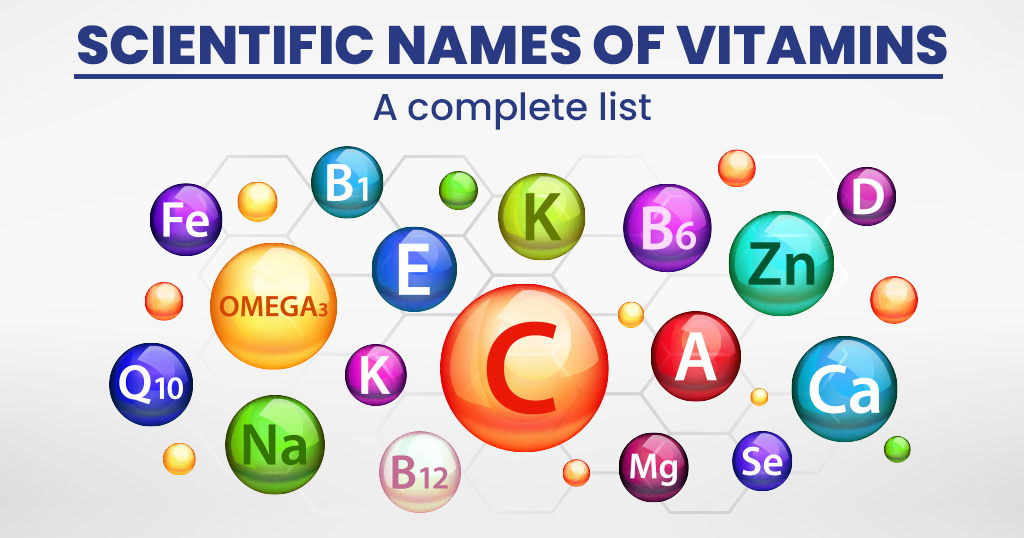There are both common names and scientific names for various animals, plants, and other living things. Likewise, each vitamin has its corresponding scientific name. Their compositions, physical and chemical characteristics, and biochemical functions serve as the foundation for this nomenclature.
What Are Vitamins?
Vitamins are organic substances that support an organism’s ability to carry out its biological tasks. It is an essential nutrient that needs to be consumed in the right amounts each day.
As organic molecules that are needed in extremely small amounts, vitamins are referred to as micronutrients. They carry out crucial tasks and play a crucial part in bodily processes like digestion, immunity, and metabolism.
Greek words “vita” and “amine” make up the word “vitamine.”
Vitamins’ Scientific Names and Sources :
| Common Name | Scientific Name | Food Sources |
| Vitamin A (Fat-soluble) | Retinol | Green leafy vegetables, nuts, tomatoes, oranges, ripe yellow fruits, guava, milk, liver, carrots, broccoli and watermelon. |
| Vitamin B1 (Water-soluble) | Thiamine | Fresh fruits, corn, cashew nuts, potatoes, sweet potatoes, peas, wheat, milk, dates, black beans, etc. |
| Vitamin B2 (Water-soluble) | Riboflavin | Bananas, grapes, mangoes, peas, pumpkin, dates, yoghurt, milk, mushrooms, popcorn, beef liver, etc. |
| Vitamin B3 (Water-soluble) | Niacin | Meat, eggs, fish, milk products, guava, mushroom, peanuts, cereals, green peas, etc. |
| Vitamin B5 (Water-soluble) | Pantothenic Acid | Meat, kidney, egg yolk, broccoli, peanuts, fish, chicken, milk, yogurt, legumes, mushrooms, avocado, etc. |
| Vitamin B6 (Water-soluble) | Pyridoxine | Pork, chicken, fish, bread, wholegrain cereals, eggs, vegetables, soya beans, etc. |
| Vitamin B7 (Water-soluble) | Biotin | Walnuts, peanuts, cereals, milk, egg yolks, salmon, pork, mushroom, cauliflower, avocados, bananas, raspberries, etc. |
| Vitamin B9 (Water-soluble) | Folic Acid | Citrus fruits, green leafy vegetables, whole grains, legumes, beets, etc. |
| Vitamin B12 (Water-soluble) | Cobalamin | Fish, meat, poultry, eggs, milk, etc. |
| Vitamin C (Water-soluble) | Ascorbic acid | Fresh citrus fruits such as orange and grapefruit, broccoli, goat milk, black currant and chestnuts. |
| Vitamin D (Fat-soluble) | Calciferol | Fish, beef, cod liver oil, egg yolk, liver, chicken breast and cereals. |
| Vitamin E (Fat-soluble) | Tocopherol | Potatoes, pumpkin, guava, mango, milk, nuts and seeds. |
| Vitamin K (Fat-soluble) | Phytonadione | Tomatoes, broccoli, mangoes, grapes, chestnuts, cashew nuts, beef and lamb. |
In the early 20th century, it was well established that a diet consisting just of purified carbs, proteins, fats, and minerals was insufficient to support an individual’s healthy growth and development. Sir Frederick Gowland Hopkins, an English biochemist, received the Nobel Prize for his role in the discovery of vitamins in 1929.
These organic substances are divided into the following categories based on their physical and biological activity:
Water-soluble vitamins:
- Biotin.
- Niacin.
- Pyridine.
- Thiamine.
- Vitamin C.
- Folic acid.
- Riboflavin.
- Vitamin B12.
- Pantothenic acid.
Fat-soluble vitamins:
- Vitamin A.
- Vitamin D.
- Vitamin E.
- Vitamin K.
























